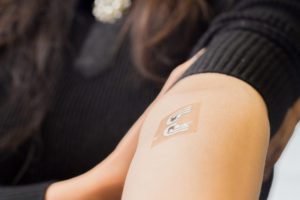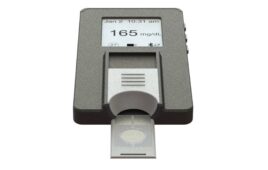
[Image from UC San Diego]
There are approximately 30.3 million people living with diabetes in the U.S., according to the American Diabetes Association. Monitoring blood sugar levels is an important part of managing their condition. For people like Angela Valdez, that daily task is avoided because of the traditional pricking of the finger.
“I don’t handle monitoring my diabetes as I should,” said Valdez in a press release. “I have the diet down a lot better now and I take my medication as I should, but the finger pricking is a struggle for me. I only test if I feel bad. If I don’t feel my blood sugar level is high, and I’m taking the pill every day, I think I’m alright. Which is really bad thinking, but the pin prick is terrifying.”
Approximately 25% of people who are receiving insulin treatment infrequently or never test their blood sugar levels while another 65% who use drugs to treat their diabetes only test once a month or less, according to Dr. Edward Chao, a physician at VA San Diego Healthcare System and a clinical professor of medicine at UC San Diego.
“Adherence to chronic disease management is low—about 50 percent. Diabetes is no exception,” said Chao. “There’s more self-management involved in diabetes, including using needles to test blood glucose, monitoring foot health, managing medications and keeping regular clinical appointments. That’s a lot more than many other conditions. We need to introduce a tool that reduces discomfort or inconvenience to increase vital monitoring of glucose.”
Researchers from UC San Diego’s Jacobs School of Engineering are in the process of developing a glucose monitor patch that works like a temporary tattoo to measure blood sugar – without a prick.
“Just like a kid’s temporary tattoo, you apply it on the arm, dab with water and remove the back paper,” said Patrick Mercier, an assistant professor in the department of electrical and computer engineering. “Our tattoo, however, is printed with material containing two electrodes that apply a small amount of electrical current. This forces glucose molecules that reside below the skin to rise to the surface, allowing us to measure blood sugar. It’s safe and you can’t really feel it.”
The “tattoo” sensor is being tested in a phase I clinical trial led by Chao. The clinical trial will test the tattoo sensor’s accuracy at detecting glucose levels compared to traditional glucometers.
Valdez is a participant in the study. Participants wear the sensor during fasting and at different times for up to a couple of hours after eating. Glucose levels from the tattoo will be compared to results from a finger stick glucose reading.
“They placed the sensor on my shoulder and I washed it and dried it,” said Valdez. “They said I should feel a mild sensation when they plugged in the electronic glucose monitor. I didn’t. At one point it felt like a bug landed on me, but it was barely noticeable. After the first round, I took a break to eat and work at my desk for a short time. I functioned like I normally do. I went back for the second round and didn’t feel any discomfort. I can see wearing it all day.”
The clinical trial is enrolling 50 adults who are ages 18 to 75 and have type 1 and type 2 diabetes.
The researchers hope that the tattoo sensor can help break down any barriers that deter patients from testing their blood glucose regularly. They also hope to further develop the sensor to monitor all day instead of the one readout it currently has. The researchers suggest that the tattoos could be the same price as glucose test strips, which run at about $1 per single-use strip.
“Drawing blood is uncomfortable. No one likes doing it. The beauty of the technology we are developing is that it is a truly noninvasive means to measure glucose,” said Mercier. “The main purpose of our research is to develop new technologies that can monitor glucose without drawing blood and ideally measure it over the course of the day. By giving this real-time information to patients, they can manage their consumption of sugars and injections of insulin much better than with periodic spot measurements.”
The research was funded by a CTRI Clinical Research Pilot Project grant and a UC San Diego Academy of Clinician Scholars Faculty Development grant.




